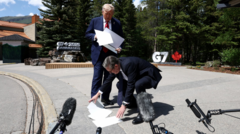Did Starmer Grab Papers to Dodge Security Intervention?

Understanding the Significance of the UK-US Trade Deal Amidst Political Farce
The recent G7 Summit witnessed a moment that, while humorous, highlighted the serious implications of international diplomacy. UK Prime Minister Sir Keir Starmer's quick action to retrieve papers dropped by US President Donald Trump during a press briefing underscores the intricate dance of political relations. This encounter was not merely a fleeting spectacle; it encapsulated the importance of the newly signed UK-US trade deal, a development that carries significant weight for both nations, particularly for industries on both sides of the Atlantic. In this article, we will delve into the details of the trade deal, its potential impact on the economy, and the broader implications of this diplomatic engagement.
The Context of the Trade Deal
The UK and US have long enjoyed a special relationship, one that has been tested in recent years by various political and economic challenges. The announcement of a new trade deal at the G7 Summit comes at a crucial time when both nations are navigating post-pandemic recovery and shifting global trade dynamics. Sir Keir Starmer's statement regarding the deal emphasizes its significance for job protection, particularly for workers at Jaguar Land Rover (JLR) and in the broader supply chain.
Key Details of the UK-US Trade Deal
The trade agreement marks a pivotal moment in UK-US relations, featuring several critical components:
- Removal of Tariffs: The deal eliminates tariffs on the aerospace sector, a crucial benefit for UK manufacturers.
- Reduction of Import Taxes: The levy on cars exported from the UK to the US has been cut to 10%, aiming to boost automotive exports.
- Ongoing Negotiations: While tariffs on cars have been addressed, talks continue regarding the 25% charges on steel imports, which remain a contentious issue.
These elements reflect an effort to foster closer economic ties, but they also bring to light the complexities of trade negotiations, particularly in the context of rising protectionism and economic nationalism.
The Economic Ramifications
At the heart of this trade deal lies the potential to protect jobs and stimulate economic growth. Sir Keir Starmer's comments about the relief felt by JLR employees resonate with the concerns of thousands of workers across the UK whose livelihoods depend on the automotive and manufacturing sectors. The importance of JLR cannot be overstated; it is not just a car manufacturer, but a symbol of British engineering and innovation.
Impact on Jaguar Land Rover and the Supply Chain
With approximately 44,000 workers at JLR, the implications of this trade deal are profound:
- Job Security: The agreement offers a lifeline for employees, ensuring that their roles remain secure in a volatile market.
- Increased Exports: Lower tariffs on car exports to the US could lead to increased sales, benefiting the entire supply chain.
- Investment Opportunities: A favorable trade environment may attract investments, leading to innovation and expansion within the UK automotive sector.
However, the ongoing negotiations around steel tariffs remain a concern. Steel is a critical component for automotive manufacturing, and delays in reaching an agreement could hinder growth prospects for JLR and other manufacturers reliant on steel imports.
Political Dynamics and Responses
The trade deal has not been without controversy. Opposition parties in the UK have criticized the agreement, labeling it a "tiny tariff deal." Conservative Party leader Kemi Badenoch's characterization reflects the skepticism surrounding the deal's scope and effectiveness. The political landscape is fraught with tension, as various factions vie for influence and public support.
The Role of Leadership in Trade Negotiations
Leaders like Sir Keir Starmer play a crucial role in navigating these complex negotiations. His quick response to the situation with President Trump at the G7 Summit illustrates the delicate balance of maintaining diplomatic relations while advocating for national interests. In a world where global trade agreements can shift rapidly, the ability to adapt and respond effectively is paramount.
The Future of UK-US Relations
As the dust settles on this recent summit, the future of UK-US relations will largely depend on how both countries approach ongoing trade negotiations and economic collaboration. The success of this trade deal could serve as a foundation for future agreements, fostering a stronger economic partnership in an increasingly interconnected world.
Potential Areas for Future Collaboration
Looking ahead, there are several areas where the UK and US could deepen their trade relationship:
- Technology and Innovation: Collaborating on technological advancements and innovation could yield mutual benefits in various sectors.
- Environmental Standards: Joint efforts to tackle climate change and promote sustainable practices could enhance trade relations while addressing global challenges.
- Healthcare and Pharmaceuticals: Strengthening ties in the healthcare sector could improve access to medicines and healthcare resources across both nations.
The potential for collaboration is vast, but it requires careful navigation of political landscapes, public sentiment, and economic realities.
Conclusion: A New Chapter in UK-US Trade Relations
The G7 Summit provided a backdrop for a significant moment in UK-US trade relations, marked by a blend of humor and seriousness. The newly signed trade deal represents a crucial step towards securing jobs and fostering economic growth, particularly in the automotive sector. As the UK and US continue to navigate the complexities of international trade, the future holds both challenges and opportunities. The path forward will require astute leadership, ongoing negotiations, and a commitment to collaboration.
As we reflect on the implications of this trade deal, it prompts us to consider: How will these developments reshape the economic landscape for both countries in the coming years? Will they be able to address the ongoing challenges of steel tariffs and other trade barriers effectively?
Frequently Asked Questions
What are the main benefits of the UK-US trade deal?
The main benefits include the removal of tariffs on the aerospace sector, reduced import taxes on cars, and the potential for job security and growth in the automotive sector.
How does the trade deal affect Jaguar Land Rover?
The deal provides a sense of security for JLR employees by protecting their jobs and potentially increasing exports to the US due to lower tariffs.
What are the ongoing negotiations concerning steel tariffs?
Negotiations are still taking place regarding the 25% tariffs on steel imports, which remain a significant concern for manufacturers relying on steel for production.
In conclusion, the political and economic ramifications of the UK-US trade deal will be felt for years to come. As these two nations navigate their relationship, the focus remains on fostering collaboration and addressing the challenges that lie ahead. What do you think the future holds for UK-US trade relations? #UKUSTrade #EconomicGrowth #InternationalRelations
Published: 2025-06-17 21:27:07 | Category: sport



